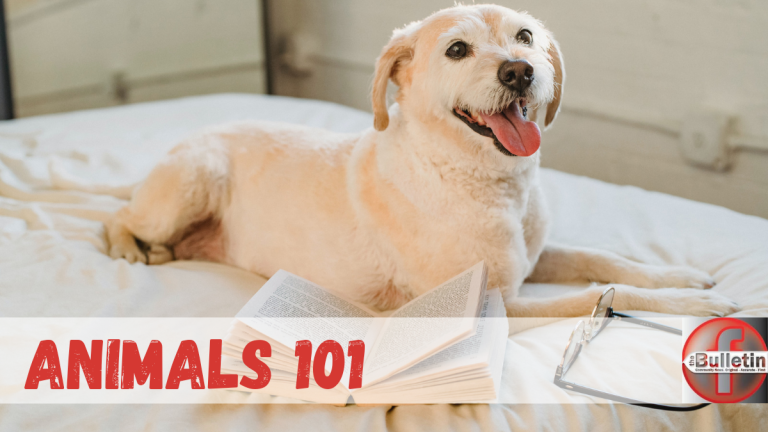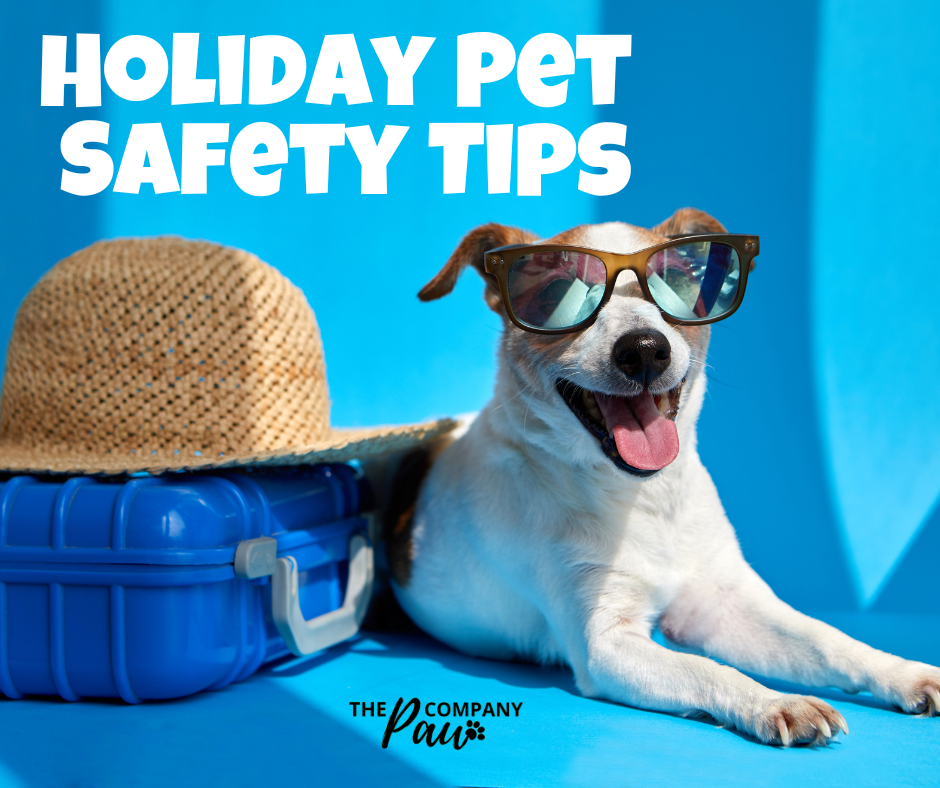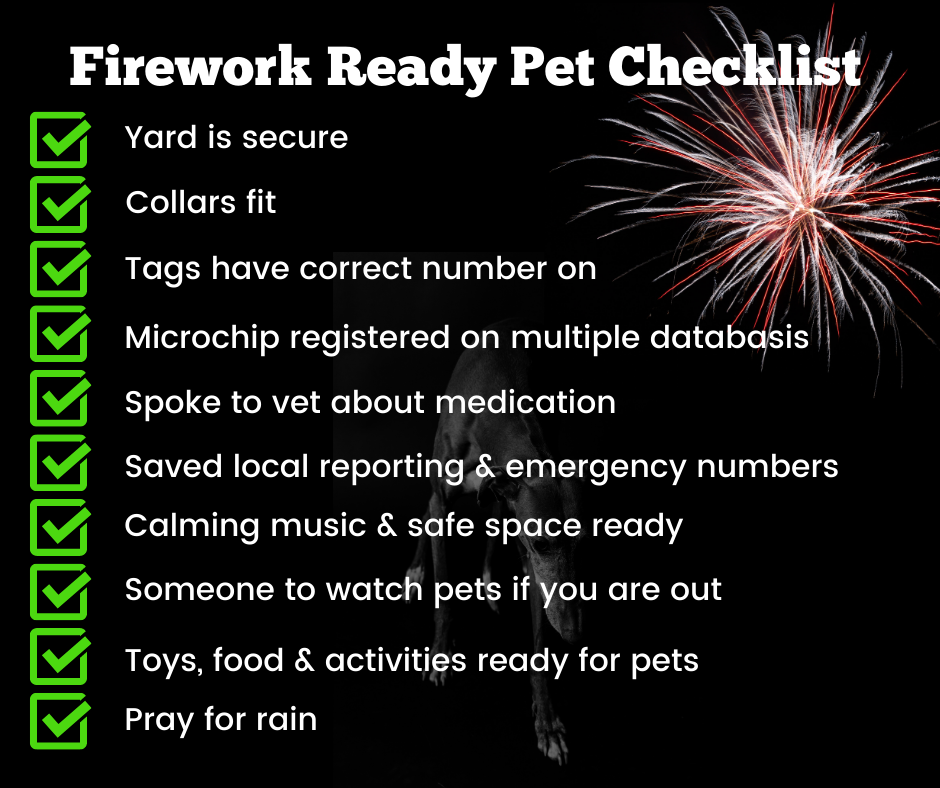
KEEPING YOUR ANIMALS SAFE DURING THE FESTIVE SEASON IS YOUR RESPONSIBILITY.
The holiday season is a time of joy, celebration, and creating cherished memories with loved ones – including your furry companions. However, the festive period can also present unique challenges and potential pet hazards. Whether you’re traveling, hosting gatherings, or enjoying outdoor activities, ensuring your pet’s safety is essential. This time of year may be very stressfull for many animals. Here is a guide to keeping your pets safe, happy, and stress-free during the holidays.

GENERAL PREPARATIONS FOR HOLIDAY SAFETY
HEALTH AND IDENTIFICATION
- Ensure your pets are up-to-date on vaccinations, deworming, and tick and flea treatments.
- Microchip your pet and register the chip with multiple databases. Confirm the microchip information is accurate and functional before you travel.
- Fit your pet with a secure collar and an ID tag that includes your current contact information.
- Keep a recent photo of your pet on your phone in case you become separated.
- Consider including provisions for your pet in your will to ensure their care in unforeseen circumstances.
EMERGENCY PLANNING
- Assemble a pet first aid kit, including items like gauze, scissors, tape, antiseptic wipes, and tweezers.
- Write down the numbers of emergency vet services and pet poison control hotlines.
- Ensure your pet’s vaccination record is easily accessible, especially when traveling across borders.
LEAVING YOUR PETS AT HOME
If you plan to leave your pets behind during the holidays, proper preparation is critical.
CHOOSING A PET SITTER
- Start searching for a pet sitter early, especially during peak holiday periods.
- Seek trusted referrals from friends, family, or your veterinarian.
- Meet potential sitters in person to observe how they interact with your pet and ask key questions, such as:
- Do they have experience with your type of pet?
- Have they completed training in pet behavior or first aid?
- What is their protocol for emergencies?
- List your pet sitter with your vet, if you are away.

PREPARING YOUR HOME
- Provide clear instructions regarding your pet’s feeding, medication, and daily routine.
- Stock up on necessary supplies, including food, water, treats, toys, leashes, and cleaning materials.
- Escape-proof your home and yard to prevent accidental escapes.
- Leave an extra set of keys with a trusted neighbour or friend as a backup.
- Create a homely atmosphere by leaving a worn shirt with your scent near your pet’s bed and turning on the TV or radio occasionally.
TRAVELING WITH YOUR PET
If your pet is accompanying you on holiday, their safety and comfort should be the top priority.
Road Trip Essentials
- Travel Safety: Secure your pet in a crash-tested crate or safety harness. Never allow pets to ride unrestrained in the car.
- Pit Stops: Plan regular breaks for bathroom needs and exercise. Bring cleanup supplies, a leash, and water from home to prevent digestive upset.
- Packing Checklist:
- Food and water bowls
- Medications
- Favorite toys, blankets, or bed for familiarity
- A pet first aid kit
- Vaccination records
- Recent photo of your pet
- Prevent Overheating: Never leave your pet unattended in a vehicle, as temperatures can rise dangerously fast, even with windows cracked.
- Make sure you know who are the closest vets wherever you go.
Cross-Border Travel
- Ensure all necessary vaccination records and permits are ready.
- Familiarize yourself with the pet regulations of your destination.

OUTDOOR ACTIVITIES
POOL, BEACH, AND LAKE SAFETY
- Always supervise pets near water, as not all are strong swimmers.
- Invest in a pet life jacket, especially for boating or swimming in open water.
- Rinse your pet after swimming to remove chlorine, salt, or bacteria.
- Protect against sunburn with animal-safe sunscreen for breeds prone to skin sensitivity.
- Watch for signs of heat stroke, such as excessive panting, vomiting, or lethargy.
- Keep pets away from hazards like fishing hooks, toxic seaweed, and sharp shells.
HIKING AND CAMPING
- Ensure your pet’s ID tag is updated and attach it securely to their collar.
- Pack essentials like collapsible water bowls, poop bags, healthy snacks, and a safety rope.
- Keep your pet leashed to prevent wildlife encounters and don’t let your pet chase any wildlife.
- Provide shade and hydration, especially in hot weather.
- Use reflective gear for nighttime safety.
- Be aware of toxic plants and keep your pet away from unfamiliar vegetation, as well as stagnant water and water with blue-green algae.
- Be careful around camp fires.
BOATING
- Fit your pet with a life jacket and ensure they’re comfortable wearing it.
- Provide fresh water and shade, to prevent dehydration.
- Plan potty breaks onshore if needed.
- Avoid boating in extreme heat and keep a close eye on your pet to prevent accidents.

MANAGING HOLIDAY STRESS FOR PETS
Animals don’t get to choose where they live. They are forced to live in this human world and therefore it is our responsibility and moral duty to help them cope. We can’t always avoid stressful events but you can:
- Observe your animal’s body language to help them cope.
- Always have one or two safe spaces in your home that are only theirs.
- Don’t leave fearful animals alone during such events.
HOSTING GATHERINGS
- Create a safe, quiet space where your pet can retreat if they feel overwhelmed.
- Inform guests not to feed your pets human food, as many holiday treats can be toxic.
- Secure doors and gates to prevent escapes as people come and go.

FIREWORKS AND LOUD NOISES
Here are some tips for stressful events before, during, and after:
Before – Help desensitize long before such an expected stressful event like fireworks or thunderstorms.
During – There is so much you can do during such events to help your pet cope better.
After – You need to help your animals destress after such an event too.
Also, read more about the natural behaviour of your pets.
HOT WEATHER SAFETY TIPS FOR PETS

Avoid Leaving Pets in Vehicles
Never leave your pet alone in a vehicle, as overheating can be fatal, even with cracked windows. The temperature inside a vehicle can rise rapidly.
Time Outdoor Activities
Schedule walks in the early morning or late evening when temperatures are cooler. Limit outdoor exercise on extremely hot days and keep it brief.
Protect Paw Pads
Test the pavement, ground, or road with the back of your hand. If it’s too hot for your hand, it’s too hot for their paws. Choose cooler surfaces or use protective booties.
Provide Shade and Water
Never leave pets in direct sunlight. Ensure they have access to shade and offer plenty of fresh, cool drinking water to stay hydrated.
Regulate Indoor Temperature
Use air conditioning, and fans, or provide access to cooler areas like basements or darker rooms with tile floors to maintain a comfortable indoor environment.
Special Considerations for Certain Breeds
Take extra precautions for old, overweight, or snub-nosed dogs, such as Boston terriers, Pekingese, Pugs, Lhasa Apsos, Shih Tzus, and Bulldogs. Monitor dogs with heart or lung diseases closely.
Recognize Signs of Heat Stroke
Be vigilant for signs such as panting, difficulty breathing, vomiting, diarrhea, confusion, rapid pulse, bright red gums, and a blue tongue or lips.
Immediate Treatment for Heat Stroke
If you suspect heat stroke, move your pet to a cool place and lower their body temperature with cool (not icy) water. Contact your veterinarian promptly.
Avoid Ice Cubes: Ice cubes are not recommended due to safety factors. Opt for safer cooling methods to protect your pet in hot weather.

LONG-TERM PET CARE CONSIDERATIONS
While holidays are temporary, responsible pet ownership requires planning for your pet’s future.
- Include your pets in your emergency plan, designating a trusted guardian to care for them in case of illness or an accident.
- Regularly update your pet’s medical and care records to ensure their needs are met, even in your absence.
- Include them in your Will!
The holiday season can be a wonderful time for you and your pets with careful planning and thoughtful precautions. Whether traveling, hiking, swimming, or simply enjoying time at home, prioritize their safety and comfort. By doing so, you’ll ensure this festive season is joyous and stress-free for all members of your family – furry ones included!
Please remember that this is the worst time of year for any rescue organization. While most people look forward to the fun and festivities, animal rescuers brace themselves for the unfortunate surge of surrendered, lost, and abandoned animals. Be kind to the rescuers and help them in any way you can.
If you find any animals lost, in distress, injured, or abandoned, please contact your nearest SPCA or rescue organization. Please report any cruelty to animals to the SPCA.
Join us again next week as we look at Christmas-specific safety tips.
Your writing has a way of resonating with me on a deep level. It’s clear that you put a lot of thought and effort into each piece, and it certainly doesn’t go unnoticed.
Thank you for the compliment. Glad my writing resonates with you.